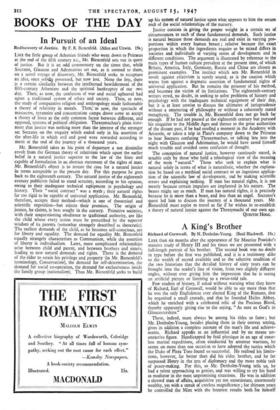BOOKS OF THE DAY
In Pursuit of an Ideal
Rediscovery of Justice. By F. R. Bienenfeld. (Allen and Unwin. 15s.)
Luce the little group of Athenian friends who went down to Peiraeus at the end of the fifth century "Lc., Mr. Bienenfeld sets out in quest of justice. But it is an odd commentary on the times that, while Socrates, Glaucon and Adeimantus set out, as it seemed to them, on a novel voyage of discovery, Mr. Bienenfeld seeks to recapture an idea, once solidly possessed, but now lost. None the less, there is a certain similarity between the intellectual bewilderment of the fifth-century Athenians and the spiritual bankruptcy of our Dwn day. Then, as now, the confusion of war and social upheaval had upset a traditional system of ethics and society. Then, as now, the study of comparative religion and anthropology made fashionable a theory of relativity in morals. Then; as now, the spectacle of massacres, tyrannies and concentration camps drove some to accept a theory Cif force as the only common factor between different, and opposed, systems of political obligation. Thrasymachus's plain state- ment that justice was nothing more than the interest of the stronger set Socrates on the enquiry which ended only in his assertion of the after-life in which evil and good were rewarded according to merit at the end of the journey of a thousand years.
Mr. Bienenfeld takes as his point of departure a not dissimilar revolt from the German theory of relativism which upset the earlier belief in a natural justice superior to the law of the State and capable of formulation in an abstract statement of the rights of man. Mr. Bienenfeld's object is to restate the case for a natural justice in terms acceptable to the present day. For this purpose he goes back to the eighteenth century. The natural justice of the eighteenth century publicists failed to stand scrutiny, according to his opinion, owing to their inadequate technical eqflipment in psychology and history. Their " social contract " was a myth ; their natural rights far too rigid to be capable of universal application. Mr. Bienenfeld, therefore, accepts their method—which is one of theoretical and scientific exposition—but rejects their premises. The origin of justice, he claims, is best sought in the nursery. Primitive societies, with their unquestioning obedience to traditional authority, are like the child whose every action must be prescribed by the superior wisdom of its parents (somewhat strangely described as theocratic). The earliest demands of the child, as he becomes self-conscious, are for liberty and equality. The demand for equality Mr. Bienenfeld equally strangely characterises as Communism, while the assertion of liberty is individualism. Later, more complicated relationships arise between child and parent, and between brothers and sisters, leading to new natural demands and rights. There is the demand of the elder to retain his privilege and property (in Mr. Bienenfeld's terminology, Conservatism), the demand for self-determination, the demand for social co-operation, the demand for exclusiveness inside the family group (nationalism). Thus Mr. Bienenfeld seeks to build up his system of natural justice upon what appears to him the secure rock of the social relationships of the nursery.
Justice consists in giving the proper weight in a certain set of circumstances to each of these fundamental demands. Such justice is natural because these demands are real and exist in varying pro- portions within every horn= breast ; relative because the exact ' proportion in which the ingredients require to be mixed differs in societies and individuals of varying states of development and in different conditions. The argument is illustrated by reference to the main types of human culture prevalent at the present time, of which Britain, America, Italy, Germany, Russia and China are chosen as prominent examples. The instinct which sets Mr. Bienenfeld in revolt against relativism is surely sound, as is the caution which warns him against a dogmatic assertion of fundamental rights of universal application. But he remains the prisoner of his method, and becomes the victim of its limitations. The eighteenth-century writers erred, no doubt, in seeking to solve problems of history and psychology with the inadequate technical equipment of their day, but it is at least unwise to discuss the ultimates of jurisprudence without a smattering of philosophy or without a coherently stated metaphysic. The trouble is, Mr. Bienenfeld does not go back far enough. If he had not paused at the eighteenth century but pursued his enquiries to the Middle Ages and thence to the great authorities of the distant past, if he had strolled a moment in the Academy with Aristotle, or taken a trip in Plato's company down to the Peiraeus to hear Socrates confuting Thrasyrnachus, or talking late into the night with Glaucon and Adeimantus, he would have saved himself much trouble and avoided some confusion of thought.
The conception of patural justice, however cautiously stated, is tenable only by those-who hold a teleological view of the meaning of the term " natural." Those who seek to explain what is natural solely in terms of. what is naturalistic, whether the explana- tion be based on a mythical social contract or an ingenious applica- tion of the scientific law of development, end by making scientific errors and explaining nothing. If man has natural rights, it is not merely because certain impulses are implanted in his nature. The beasts might say as much. If man has natural rights, it is precisely because he is more than a beast, and less than an angel. Socrates's quest led him to discuss the journey of a thousand years. Mr. ,Bienenfeld must aspire to travel as far if he wishes to re-establish a theory of natural justice against the Thrasymachi of our own age. QUINTIN HoGG.


































 Previous page
Previous page